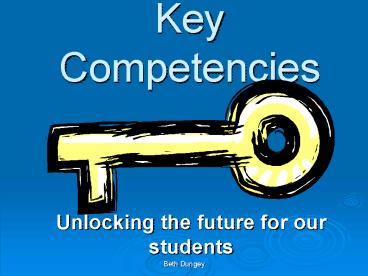Key Competencies PowerPoint PPT Presentation
1 / 23
Title: Key Competencies
1
Key Competencies
- Unlocking the future for our students
2
Key Changes (from the draft) Treaty of Waitangi
more overtValues - stronger focus on
sustainablityTe Reo/NZSL included as official
languages (English as defacto official) designin
g school curriculum rewrittenexplicit statement
about requirementspurpose scope addedvision
- connections to the land addedteaching as
inquiry added to pedagogy
3
Definition of Terms
Key competencies Are generic and needed by
everyone across many life contexts to meet
important challenges
Specific competencies Are only needed in certain
contexts. Cannot be used effectively without key
competencies and vice versa
4
Key Competencies
Knowledge, skills, attitudes and values cannot be
separated
Key competencies are interrelated and used
together
They are developed throughout life
5
Key Competencies
The ways competencies are manifested will differ
in different contexts
Proficiency should be seen as the ability to
combine and use competencies in increasingly
complex contexts
6
5 Key Competencies
- Thinking
- Understanding languages, symbols and texts
- Relating to others
- Managing self
- Participating and contributing
7
Process of learning new skills
(Zimmerman Kitsantas (1997)
8
Thinking
9
- What opportunities do students have to actively
practice thinking? - How are they introduced to a variety of thinking
patterns and skills? - What opportunities do students have to transfer
what they learn about thinking in one context
into different contexts?
10
- How well do teachers use and share a vocabulary
of thinking words, to give students the language
tools they need to think about their thinking? - Do students receive specific feedback on their
progress in learning to use these thinking tools
and approaches?
11
Languages, Symbols and Texts
12
- Working with the codes in which knowledge is
expressed - Systems for representing and communicating
information, experiences and ideas - Texts of all kinds written, spoken and visual
informative and imaginative mathematical,
scientific and technological
13
(No Transcript)
14
Managing Self
15
- Not just about organisational matters and self
discipline - Includes managing aspects of physical health
- Is about awareness of own strengths and
weaknesses - Using this self knowledge to approach living and
learning tasks strategically
16
Relating to Others
17
- About interacting effectively with a diverse
range of people - Includes the ability to listen actively,
recognise different points of view, negotiate and
share ideas - Know when it is appropriate to compete and when
to cooperate
18
Participating and Contributing
19
- Is about learning that is authentic
- Participating actively in local, national and
global communities - Balancing rights, roles and responsibilities
- Responding appropriately as a group member
20
Key Learning
- The development of key competencies requires
pedagogical change for teachers - Students (and teachers) need to learn the
language of the competencies to have shared
meaning and understanding - Teachers need to understand the way in which
students develop increasing competency over time
21
Key Learning
- Key Competencies need to be developed in context
and through the curriculum - Key Competencies are taught and not caught
- Teachers need to provide many opportunities for
the competencies to be developed in a wide range
of contexts both in the classroom and in the
wider context of the school
22
Key Learning about Assessment
- Co constructing success criteria with students
of a competency within a given context attaches
greater meaning and understanding. - Students need opportunities to self assess
themselves against agreed criteria - Stories can be used to describe increasing level
of competency in individual students or groups of
students.
23
Key Learning about Assessment
- Assessment of the Key Competencies is hugely
problematic and there is a real danger that
schools might resort to some kind of
inappropriate tick box system - Anecdotal evidence is subjective but useful.
- The interrelated nature of the Key Competencies
makes it difficult to assess in isolation
24
Schools will need to
clarify what the competencies mean for their
students
show how well the students are currently showing
them
identify the conditions that will help or hinder
development

